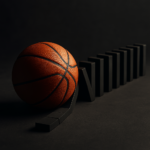
In December, Armani Jeans Milano denied Partizan Belgrade from playing in its sixth consecutive Top 16 phase of the Euroleague. And yet again, in what is now considered a trademark display of affection, fans continued singing to their players and the team they love after the buzzer. They were grateful for what they considered a memorable season in which their team again defeated the likes of Maccabi Tel Aviv and Real Madrid.
This stood in sharp contrast with results of KK Zagreb and Union Olimpija, representing what is left of the Yugoslav basketball school. Only Partizan came close (in fact, a mere two points close) to a second-phase berth. Perhaps this was expected from the league’s powerhouse, recognized for being “a system” by many, including current Los Angeles Lakers assistant coach Ettore Messina. Yet, how do they do it? What makes them competitive year after year?
Partizan plays tough on both sides of the court. Points are earned through hard work, constant screens, ferocious offensive rebounding. High-low ball movement gets repeated on and on, tiring the opponent’s defense, while agile forwards lie in wait for the scoring opportunity. Defensive intensity, trapping and pressing is equally impressive, and fast-forwards into crowd-pleasing slam dunks – This is why conditioning is everything.
Goran Grbovic, who back in 1988 took part in Partizan’s first EL Final Four appearance, affirmed this by saying “we are not artists [anymore], we are hard workers.” And he should know, since Vlade Divac, Žarko Paspalj, and Alexander Djordjevic – all basketball magicians in their time – were his teammates.
No one can explain “the system” better than the man who created it. Dusko “Dule” Vujosevic, Partizan’s legendary coach who now presides over Partizan’s entire sports association, presented some of its underpinnings in several of the “year’s wrap up” interviews. For Vujosevic, an avid reader and collector of fine arts, training one player can equal to transforming his personality: His role was to detach every individual from his own, egoistic self and subdue him to a greater, collective good. And one true personality is best discovered in a game. “You can easily discern if somebody is selfish, vain or prone to manipulation,” Vujosevic argues. What he gets in return is the ultimate reward: his players improving, not only on the court.
Every year, this system Dule helped set up gives birth to at least one outstanding young player. This season it was Vladimir Lucic’s turn to shine. Before Lucic, there was Jan Vesely in 2010; before Vesely, there were Novica Velickovic, Milenko Tepic, and many more. The sad truth behind this is that in order to survive financially, Partizan must sell its best players, most likely to the same teams they have helped beat in the first place (Pekovic and Tepic, for instance, were both sold to Panathinaikos).
Yet with the system in place, this is not an issue. Players overlooked by scouts, rejected for either being untalented or prone to injuries, forgotten as they reach their mid-20s, used to come to Partizan not knowing what to expect. Today, after Milt Palacio, Stephane Lasme, Alex Maric, Lawrence Roberts, Bo McCalebb and many others jumpstarted their careers after spending only one year with the club, Belgrade has become a desired destination. As Vujosevic puts it, “these foreigners were not nearly that good when they arrived. We place them in the system and they improve, too.” The same goes for homegrown talent: After leaving Hemofarm for Maccabi, Milan Macvan was determined to find his playing time in Partizan.
In effect, Partizan has transformed the way basketball is being played in the Adriatic. They not only have changed the pace of the game, introducing their distinctive style of physical basketball: What this club has achieved is more – a bond of love and respect between players, coaching staff and the fans – to last for years to come.
Marko Savkovic fell in love with basketball because: a) his older brother used to play, so it must have been a cool thing to do; and b) he witnessed Vlade Divac, Dino Radja and Toni Kukoc play an exhibition match back in 1988. After learning the fundamentals with Partizan Belgrade, Marko spent four years in FMP Zeleznik’s youth system and another three playing lower-division ball. Years later, as a political science graduate, he found a different career for himself, yet remained devoted to hoops. For BallinEurope, he will be closely following developments in the Adriatic league. You may write him at markosavkovic@gmail.com.




